
Wetenschap
Is het groen of voor altijd giftig? Nucleaire kloof bij klimaatbesprekingen
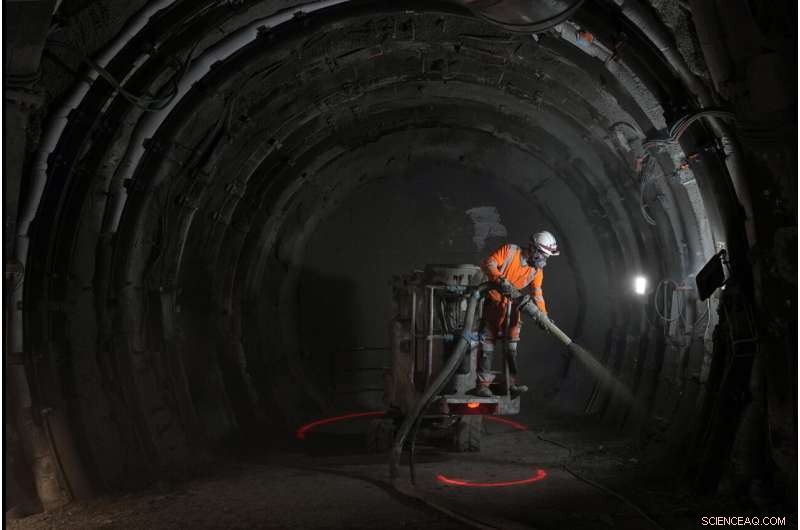
Een werknemer spuit een laag cementbescherming in een tunnel voor radioactief afval in een ondergronds laboratorium van Andra, een instantie die het afval beheert, in Bure, Oost-Frankrijk, donderdag 28 oktober 2021. Kernenergie is een centraal knelpunt terwijl onderhandelaars de toekomstige energiestrategie van de wereld uitstippelen tijdens de klimaatbesprekingen in Glasgow, Schotland. Krediet:AP Photo/Francois Mori
Diep in een Frans bos van eiken, berken en dennen, draagt een gestage stroom vrachtwagens een stille herinnering aan de vaak onzichtbare kosten van kernenergie:containers met radioactief afval die de komende 300 jaar worden opgeslagen.
Terwijl onderhandelaars tijdens klimaatbesprekingen in Schotland plannen hoe ze de wereld van brandstof kunnen voorzien en tegelijkertijd de CO2-uitstoot kunnen verminderen, is kernenergie een centraal knelpunt. Critici hekelen het gigantische prijskaartje, de onevenredige schade veroorzaakt door kernongevallen en radioactieve overblijfselen die duizenden jaren dodelijk blijven.
Maar steeds luidere en krachtigere voorstanders - waaronder enkele klimaatwetenschappers en milieudeskundigen - beweren dat kernenergie 's werelds beste hoop is om de klimaatverandering onder controle te houden, waarbij ze opmerken dat het zo weinig schadelijke emissies uitstoot en gemiddeld veiliger is dan bijna alle andere andere energiebron. Nucleaire ongevallen zijn eng, maar uiterst zeldzaam, terwijl vervuiling door steenkool en andere fossiele brandstoffen elke dag de dood en ziekte veroorzaakt, zeggen wetenschappers.
"De schaal van wat de menselijke beschaving de komende 30 jaar probeert te doen (om klimaatverandering te bestrijden) is onthutsend", zegt Matt Bowen van het Center for Global Energy Policy van Columbia University. "Het zal veel ontmoedigender zijn als we nieuwe kerncentrales uitsluiten - of nog ontmoedigender als we besluiten om kerncentrales samen te sluiten."
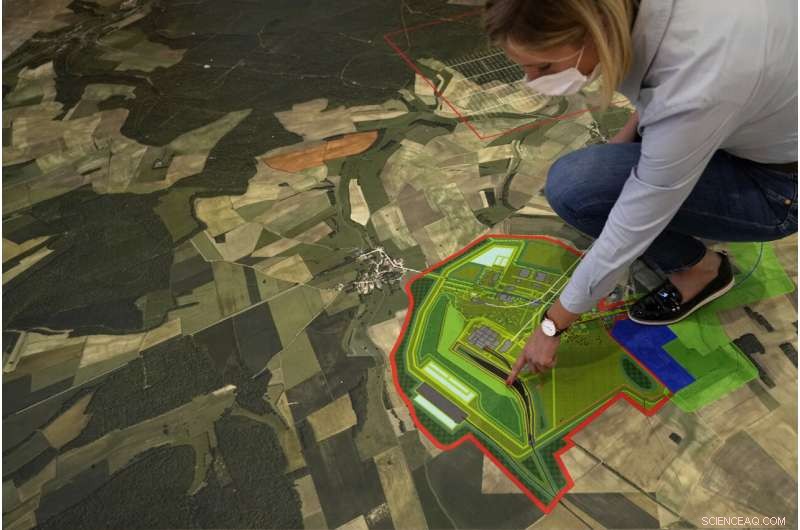
Audrey Guillemenet, geoloog en woordvoerder, toont donderdag 28 oktober 2021 een kaart van een ondergronds laboratorium dat wordt gerund door het Franse bureau voor het beheer van radioactief afval, Andra, in Bure, Oost-Frankrijk. Kernenergie is een centraal knelpunt terwijl onderhandelaars plannen maken voor de toekomstige energiestrategie tijdens de klimaatbesprekingen in Glasgow, Schotland. Krediet:AP Photo/Francois Mori
Veel regeringen dringen erop aan om kernenergie te verankeren in klimaatplannen die op de conferentie in Glasgow, bekend als COP26, worden uitgeroeid. De Europese Unie debatteert ondertussen over het al dan niet bestempelen van kernenergie als officieel 'groen' - een beslissing die de komende jaren de aanzet zal zijn voor miljarden euro's aan investeringen. Dat heeft wereldwijd implicaties, aangezien het EU-beleid een norm zou kunnen stellen die andere economieën volgen.
Maar hoe zit het met al dat afval? Reactoren over de hele wereld produceren duizenden tonnen zeer radioactief afval per jaar, bovenop wat er al is achtergelaten door tientallen jaren van gebruik van het atoom om huizen en fabrieken over de hele wereld te elektrificeren.
Duitsland leidt het peloton landen, voornamelijk binnen de EU, die resoluut tegen het labelen van kernenergie als 'groen' zijn. Ondertussen steunt de regering-Biden kernenergie, heeft China een tiental reactoren in aanbouw - en zelfs Japan promoot kernenergie weer, 10 jaar na de ramp in de kerncentrale van Fukushima.
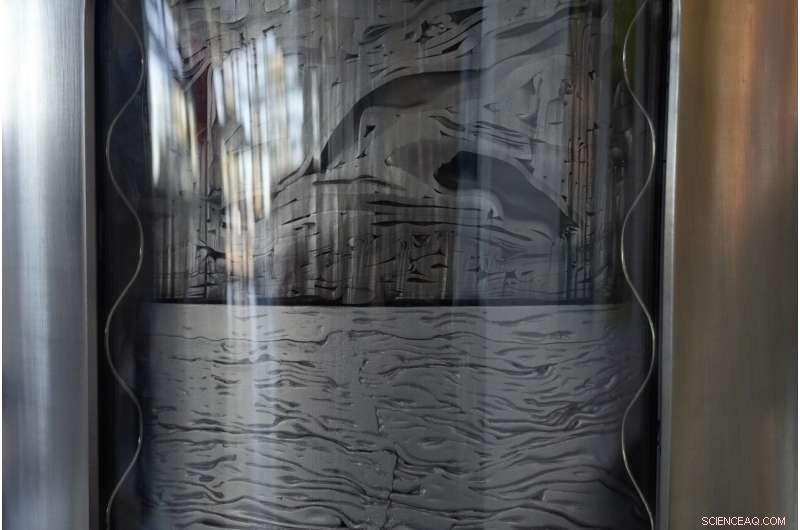
Een display van gecomprimeerd radioactief afval staat in een showroom naast een ondergronds laboratorium dat wordt gerund door het Franse bureau voor het beheer van radioactief afval, Andra, in Bure, Oost-Frankrijk, donderdag 28 oktober 2021. Kernenergie is een centraal knelpunt terwijl onderhandelaars de de toekomstige energiestrategie van de wereld tijdens de klimaatbesprekingen in Glasgow, Schotland. Krediet:AP Photo/Francois Mori
Maar nergens ter wereld is zo afhankelijk van kernreactoren als Frankrijk, dat voorop loopt bij de pro-nucleaire druk op Europees en mondiaal niveau. En het is een van de toonaangevende spelers in de nucleaire afvalindustrie, het recyclen of opwerken van materiaal van over de hele wereld.
Ten zuiden van de slagvelden van Verdun in de Eerste Wereldoorlog rijden vrachtwagens met waarschuwingsstickers voor radioactiviteit een afvalopslagplaats in de buurt van het dorp Soulaines-Dhuys binnen. Ze worden herhaaldelijk gecontroleerd, gewist en gescand op lekken. Hun lading - samengeperst afval dat in betonnen of stalen cilinders wordt gestopt - wordt door robotkranen gestapeld in magazijnen die vervolgens worden gevuld met grind en worden afgedicht met meer beton.
Het bureau dat het afval beheert, Andra, kent zijn mensen bang. "Ik kan niet vechten tegen de angsten van mensen. Het is onze rol om de veiligheid van mens en milieu en de arbeiders op de site te garanderen", aldus woordvoerder Thierry Pochot.
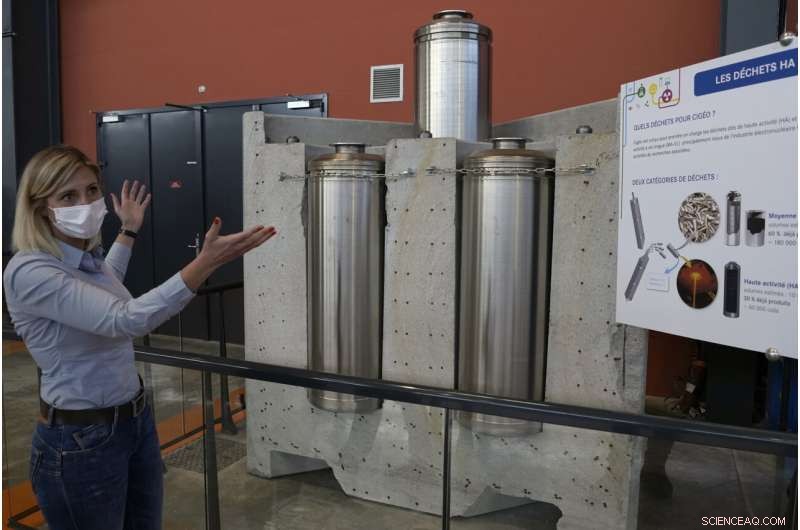
Audrey Guillemenet, geoloog en woordvoerder, toont donderdag 28 oktober 2021 een project voor radioactief afval van het Franse bureau voor het beheer van radioactief afval, Andra, in Bure, Oost-Frankrijk. Kernenergie is een centraal knelpunt terwijl onderhandelaars de toekomst van de wereld bepalen energiestrategie tijdens de klimaatbesprekingen in Glasgow, Schotland. Krediet:AP Photo/Francois Mori
De opslageenheden bevatten 90% van het laag- tot middelactief radioactief afval van Frankrijk, inclusief gereedschap, kleding en ander materiaal dat verband houdt met de werking en het onderhoud van de reactor. De site is ontworpen om minstens 300 jaar mee te gaan nadat de laatste zending is aangekomen, wanneer de radioactiviteit van de inhoud naar verwachting niet hoger zal zijn dan de niveaus die in de natuur worden aangetroffen.
Voor afval met een langere levensduur - voornamelijk gebruikte kernbrandstof, die potentieel dodelijk blijft voor tienduizenden jaren - legt Frankrijk de basis voor een permanente, diepgewortelde opslagplaats onder maïs- en tarwevelden buiten het nabijgelegen stenen huisgehucht Bure.
Zo'n 500 meter (yards) onder het oppervlak voeren arbeiders tests uit op de klei en graniet, kerven tunnels en proberen te bewijzen dat het langetermijnopslagplan de veiligste oplossing is voor toekomstige generaties. Soortgelijke sites worden ook in andere landen ontwikkeld of bestudeerd.
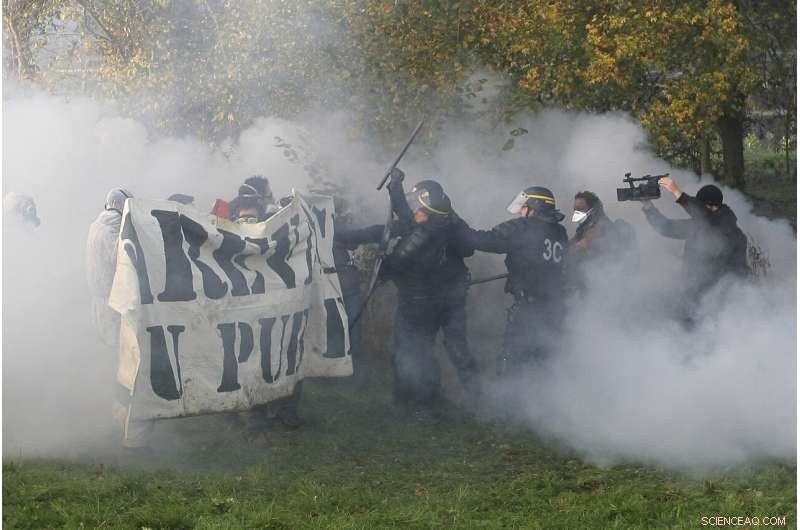
Een groep activisten botst op woensdag 23 november 2011 met oproerpolitieagenten in Lieusaint, Normandië, Frankrijk, terwijl ze proberen de treinsporen te blokkeren in een poging een trein te stoppen die geladen is met nucleair afval en op weg is naar Gorleben in Duitsland . Kernenergie is een centraal knelpunt terwijl onderhandelaars de toekomstige energiestrategie van de wereld uitstippelen tijdens de klimaatbesprekingen in Glasgow, Schotland. Critici hekelen het gigantische prijskaartje, de onevenredige schade veroorzaakt door nucleaire ongevallen en radioactief afval. Maar een groeiend pro-nucleair kamp beweert dat het gemiddeld veiliger is dan bijna elke andere energiebron. Credit:AP Foto/David Vincent, Bestand
Als de opslagplaats door de Franse regelgevende instanties wordt goedgekeurd, zou het zo'n 85.000 ton (94.000 ton) van het meest radioactieve afval bevatten dat wordt geproduceerd "van het begin van het nucleaire tijdperk tot het einde van de bestaande nucleaire faciliteiten", zegt Audrey Guillemenet, geoloog en woordvoerder van het ondergrondse lab.
"We kunnen dit afval niet achterlaten in opslaglocaties aan de oppervlakte", zei ze. "Dat is veilig, maar niet duurzaam."
The 25 billion euro ($29 billion) cost of the proposed repository is already built into budgeting by French utilities, Guillemenet said. But that's just one piece of the staggering cost of building and operating nuclear plants, and one of the reasons that opposition abounds.
All around Bure, street signs are replaced with graffiti reading "Nuclear is Over," and activists camp out at the town's main intersection.
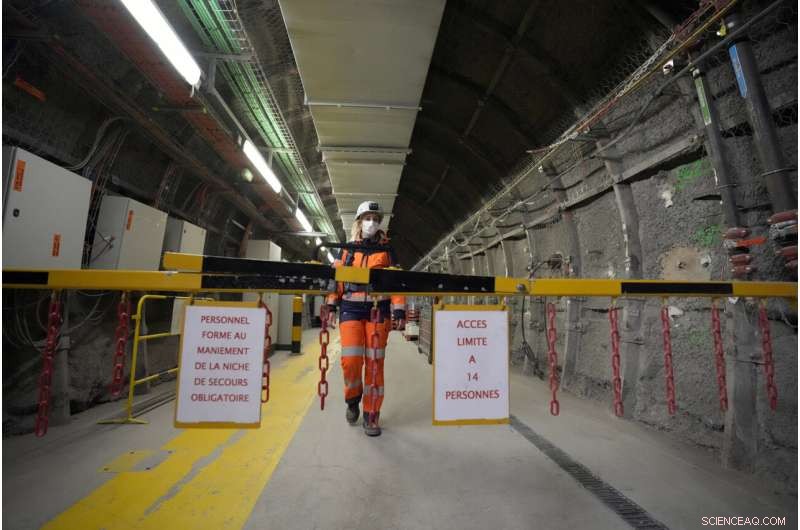
Audrey Guillemenet, geologist and spokesperson, walks in a tunnel for radioactive waste next to the emergency safety room in an underground laboratory run by French radioactive waste management agency Andra, in Bure, eastern France, Thursday, Oct. 28, 2021. Nuclear power is a central sticking point as negotiators plot out the world's future energy strategy at the climate talks in Glasgow, Scotland. Credit:AP Photo/Francois Mori
Greenpeace accuses the French nuclear industry of fobbing off waste on other countries and covering up problems at nuclear facilities, which industry officials deny. Activists staged a protest last week in the port of Dunkirk, as reprocessed uranium was being loaded onto a ship for St. Petersburg, demanding an end to nuclear energy and more research into solutions for existing waste.
"Nuclear waste ... needs to be dealt with," Bowen said. But "with fossil fuels, the waste is pumped into our atmosphere, which is threatening us from the risks of climate change and public health impacts from air pollution."
Some prominent scientists now embrace nuclear. They argue that over the past half-century, nuclear power stations have avoided the emission of an estimated 60 billion tons of carbon dioxide by providing energy that otherwise would have come from fossil fuels.
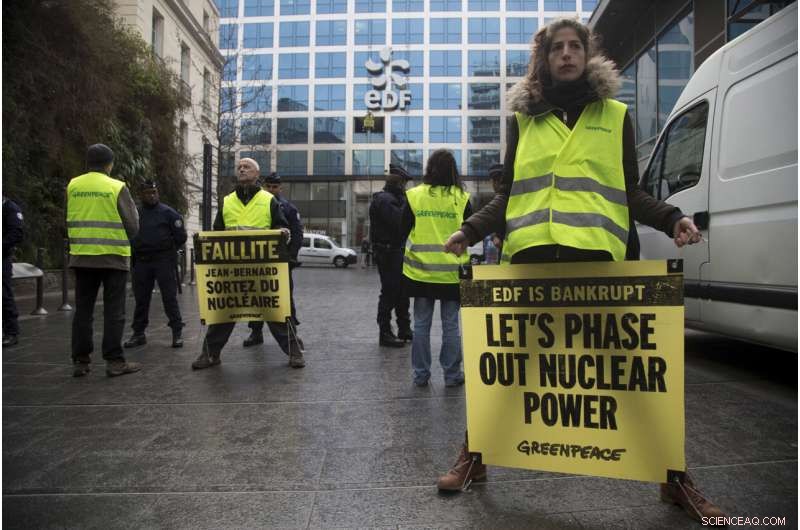
Greenpeace activists hold placards during the presentation of EDF group's 2016 results in Paris, Feb. 14, 2017. Greenpeace accuses the French nuclear industry of fobbing off waste on other countries and covering up problems at nuclear facilities, which industry officials deny. Credit:AP Photo/Thibault Camus, File
U.S. climate envoy John Kerry says he's changed his early career opposition to nuclear because of the greater necessity to cut emissions.
"People are beginning to understand the consequences of not going nuclear," said Kerry Emanuel, professor of atmospheric science at MIT. Amid a "growing awareness of the rise of climate risks around the world, people are beginning to say, 'that's a bit more frightening than nuclear power plants.'"
Some activists want to end nuclear energy today, and others want to phase it out soon. But Emanuel noted examples of countries or states that shut nuclear plants before renewables were ready to take up the slack—and had to return to coal or other planet-choking energy sources.
The current energy crunch is giving nuclear advocates another argument. With oil and gas costs driving an energy price crisis across Europe and beyond, French President Emmanuel Macron has trumpeted "European renewables and, of course, European nuclear."
-
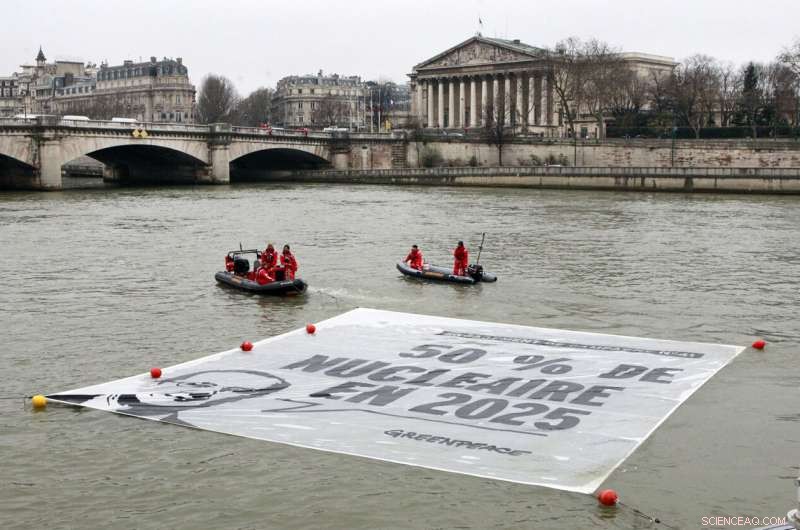
Greenpeace activists unfold a banner reading "50 percent of nuclear energy by 2025" on the Seine River in front of the National Assembly in Paris, Monday, March 9, 2015. Greenpeace accuses the French nuclear industry of fobbing off waste on other countries and covering up problems at nuclear facilities, which industry officials deny. Credit:AP Photo/Remy de la Mauviniere, File
-
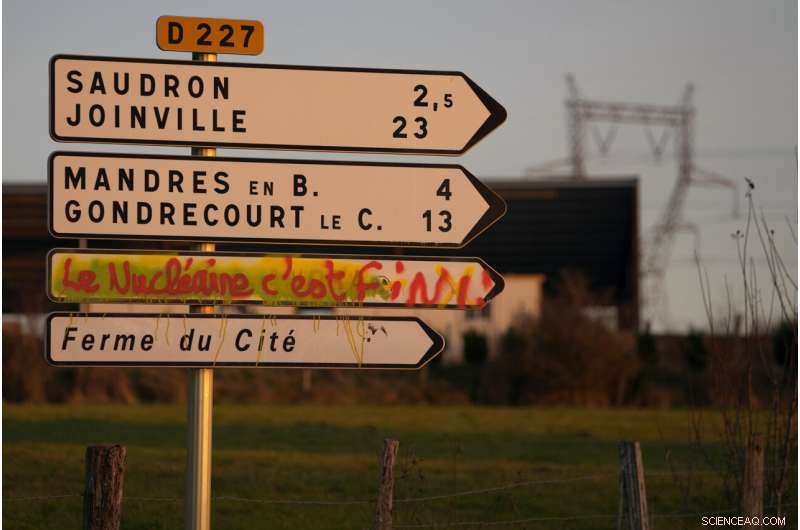
A road sign is painted with "Nuclear Is Over" next to an underground laboratory in Bure, eastern France, Thursday, Oct. 28, 2021. Nuclear power is a central sticking point as negotiators plot out the world's future energy strategy at the climate talks in Glasgow, Scotland. Credit:AP Photo/Francois Mori
-

Audrey Guillemenet, geologist and spokesperson, shows a tunnel project map for radioactive waste in an underground laboratory run by French radioactive waste management agency Andra, in Bure, eastern France, Thursday, Oct. 28, 2021. Nuclear power is a central sticking point as negotiators plot out the world's future energy strategy at the climate talks in Glasgow, Scotland. Credit:AP Photo/Francois Mori
-
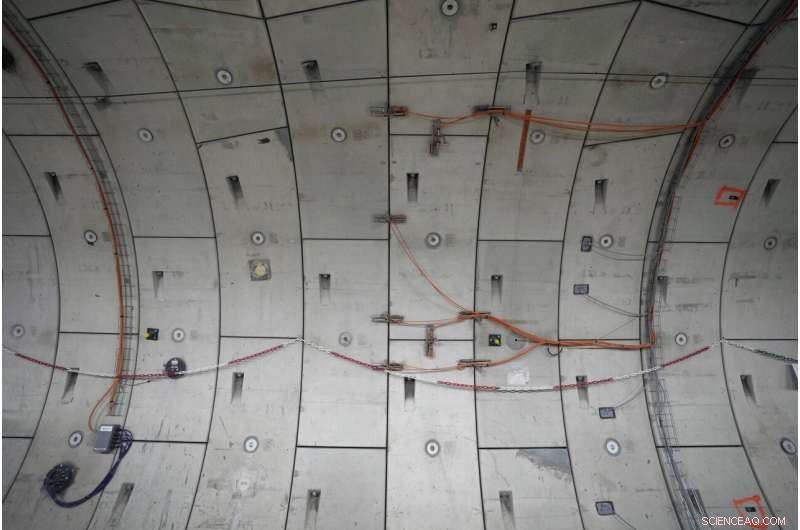
Measuring equipment and seismic detectors are placed in a tunnel for radioactive waste in an underground laboratory run by French radioactive waste management agency Andra, in Bure, eastern France, Thursday, Oct. 28, 2021. Nuclear power is a central sticking point as negotiators plot out the world's future energy strategy at the climate talks in Glasgow, Scotland. Credit:AP Photo/Francois Mori
-
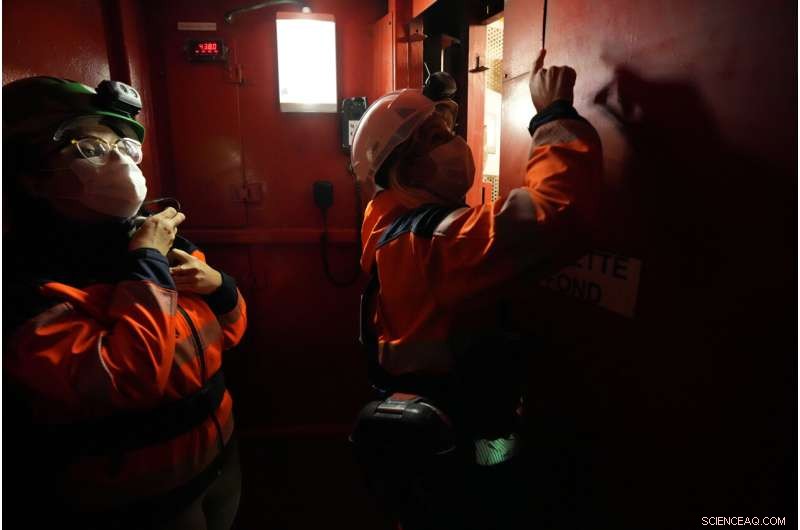
Emilie Grandidier, spokesperson for French radioactive waste management agency Andra, left, and Audrey Guillemenet, geologist and spokesperson, stand in the elevator in Bure, eastern France, Thursday, Oct. 28, 2021. Nuclear power is a central sticking point as negotiators plot out the world's future energy strategy at the climate talks in Glasgow, Scotland. Credit:AP Photo/Francois Mori
-
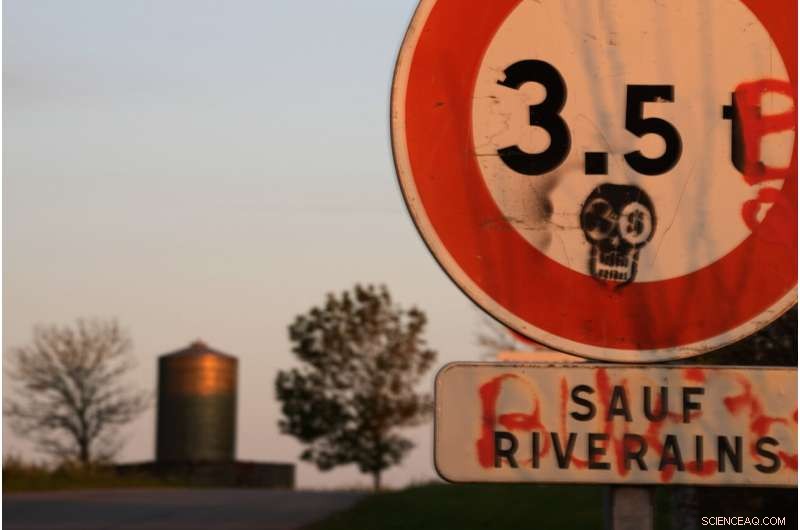
A road sign is painted with a mask with nuclear logos next to an underground laboratory run by French radioactive waste management agency Andra, in Bure, eastern France, Thursday, Oct. 28, 2021. Nuclear power is a central sticking point as negotiators plot out the world's future energy strategy at the climate talks in Glasgow, Scotland. France is laying the groundwork for a permanent, deep-earth repository beneath corn and wheat fields outside the nearby stone-house hamlet of Bure. Credit:AP Photo/Francois Mori
-
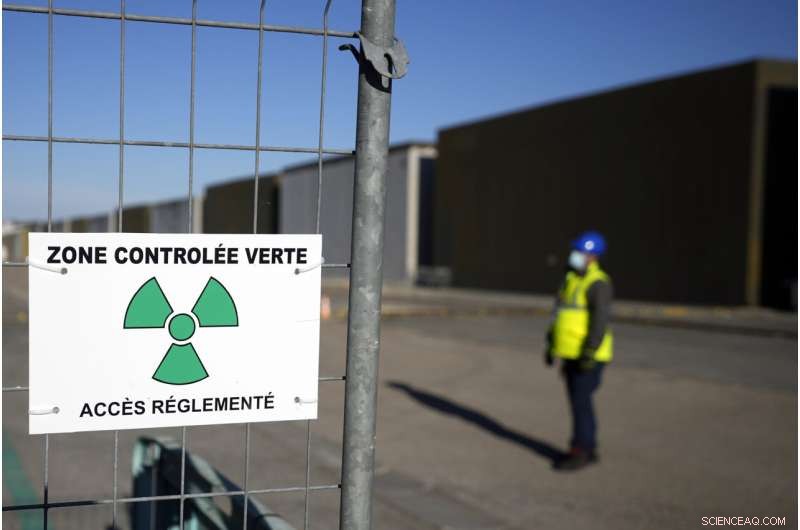
A technician stands next to a radioactive waste storage zone along a concrete-sealed warehouse in the Aube region of eastern France in Soulaines-Dhuys, Friday, Oct. 29, 2021. The site holds low- to mid-level radioactive waste from French nuclear plants as well as research and medical facilities, and its concrete-sealed warehouses are designed to store the waste for at least 300 years. Credit:AP Photo/Francois Mori
-
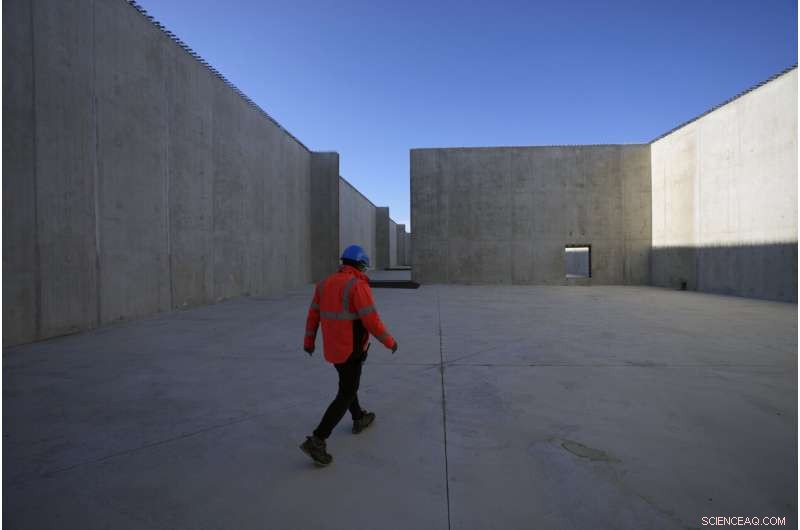
Thierry Pochot, spokesperson for radioactive waste storage sites in the Aube region of eastern France managed by French radioactive waste management agency Andra, walks in a concrete-sealed warehouse in Soulaines-Dhuys, Friday, Oct. 29, 2021. The site holds low- to mid-level radioactive waste from French nuclear plants as well as research and medical facilities, and its concrete-sealed warehouses are designed to store the waste for at least 300 years. Credit:AP Photo/Francois Mori
-
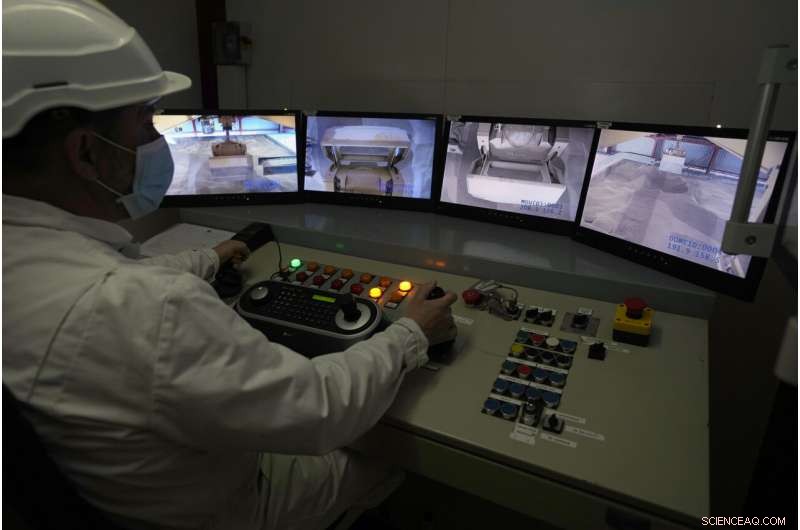
A technician pilots robots for radioactive waste storage in a concrete-sealed warehouse in the Aube region of eastern France in Soulaines-Dhuys, Friday, Oct. 29, 2021. The site holds low- to mid-level radioactive waste from French nuclear plants as well as research and medical facilities, and its concrete-sealed warehouses are designed to store the waste for at least 300 years. Credit:AP Photo/Francois Mori
-
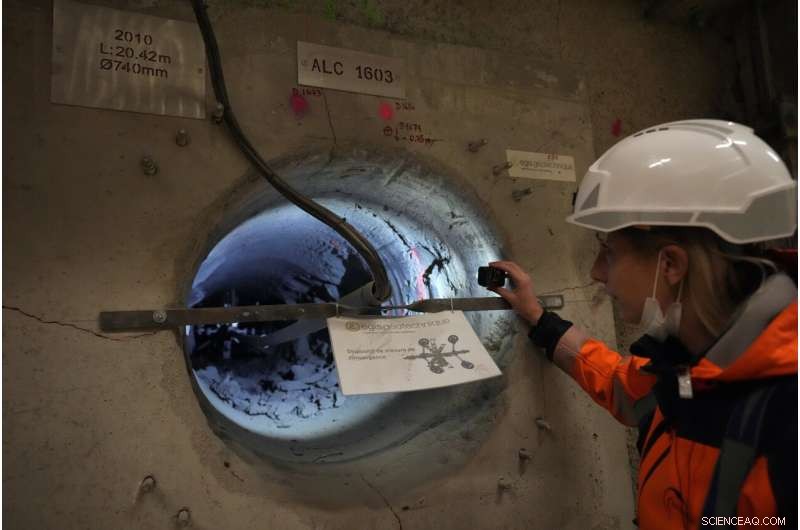
Audrey Guillemenet, geologist and spokesperson, shows a tunnel for radioactive waste in an underground laboratory run by French radioactive waste management agency Andra, in Bure, eastern France, Thursday, Oct. 28, 2021. Nuclear power is a central sticking point as negotiators plot out the world's future energy strategy at the climate talks in Glasgow, Scotland. Credit:AP Photo/Francois Mori
-
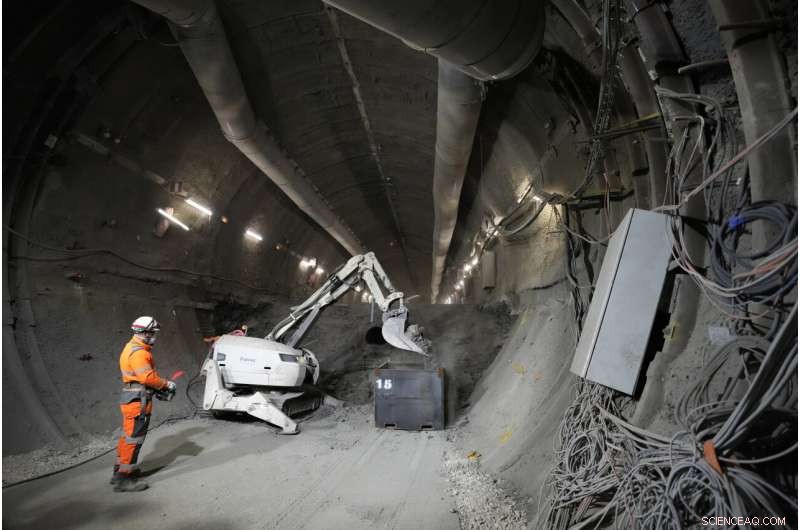
Technicians work in a tunnel for radioactive waste in an underground laboratory run by French radioactive waste management agency Andra, in Bure, eastern France, Thursday, Oct. 28, 2021. Nuclear power is a central sticking point as negotiators plot out the world's future energy strategy at the climate talks in Glasgow, Scotland. Credit:AP Photo/Francois Mori
-
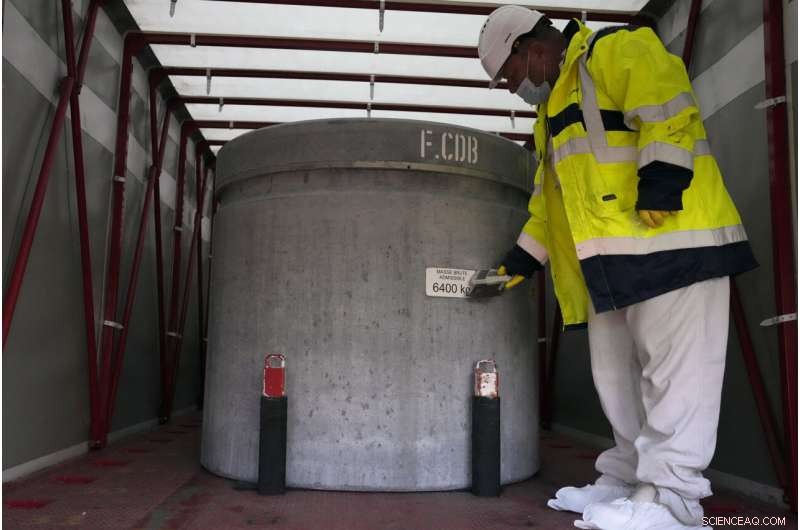
A technician works inside a truck with radioactive waste in the Aube region of eastern France, in Soulaines-Dhuys, Friday, Oct. 29, 2021. Deep in a French forest of oaks, birches and pines, a steady stream of trucks carries a silent reminder of nuclear energy's often invisible cost:canisters of radioactive waste, heading into storage for the next 300 years. Credit:AP Photo/Francois Mori
-
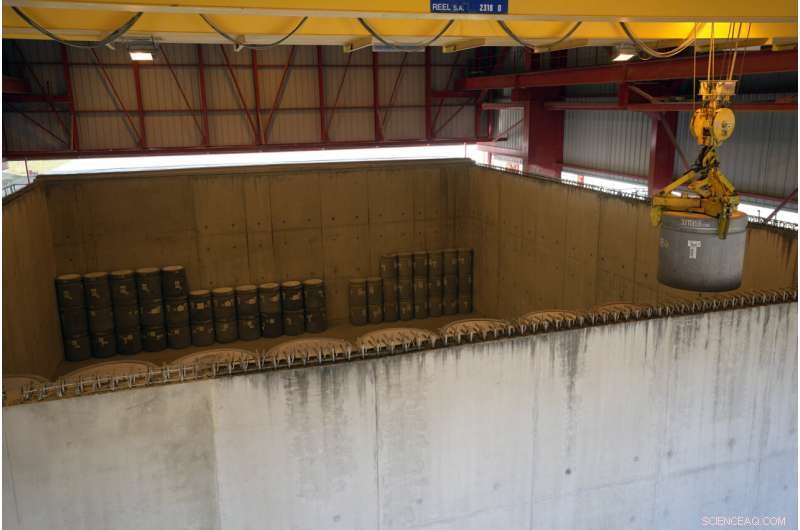
A radioactive waste storage is lifted in a concrete-sealed warehouse in the Aube region of eastern France managed by French radioactive waste management agency Andra, in Soulaines-Dhuys, Friday, Oct. 29, 2021. The site holds low- to mid-level radioactive waste from French nuclear plants as well as research and medical facilities, and its concrete-sealed warehouses are designed to store the waste for at least 300 years. Credit:AP Photo/Francois Mori
-
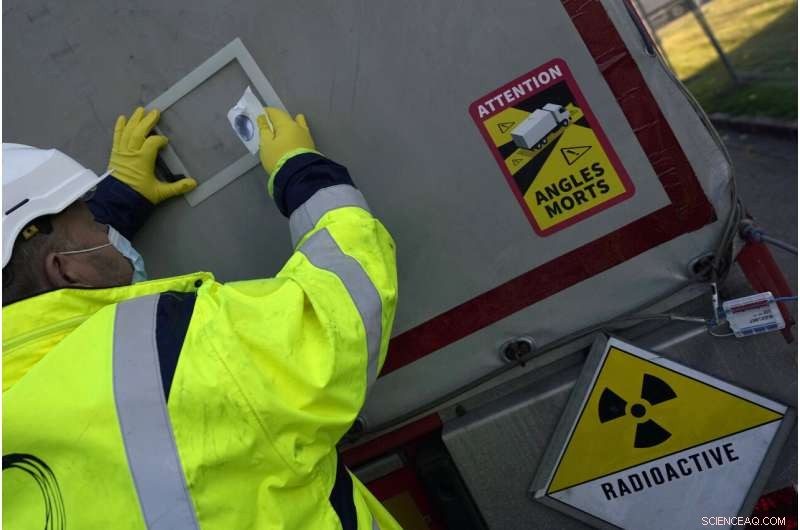
A technician controls a truck with radioactive waste in the Aube region of eastern France managed by French radioactive waste management agency Andra, in Soulaines-Dhuys, Friday, Oct. 29, 2021. Deep in a French forest of oaks, birches and pines, a steady stream of trucks carries a silent reminder of nuclear energy's often invisible cost:canisters of radioactive waste, heading into storage for the next 300 years. Credit:AP Photo/Francois Mori
-
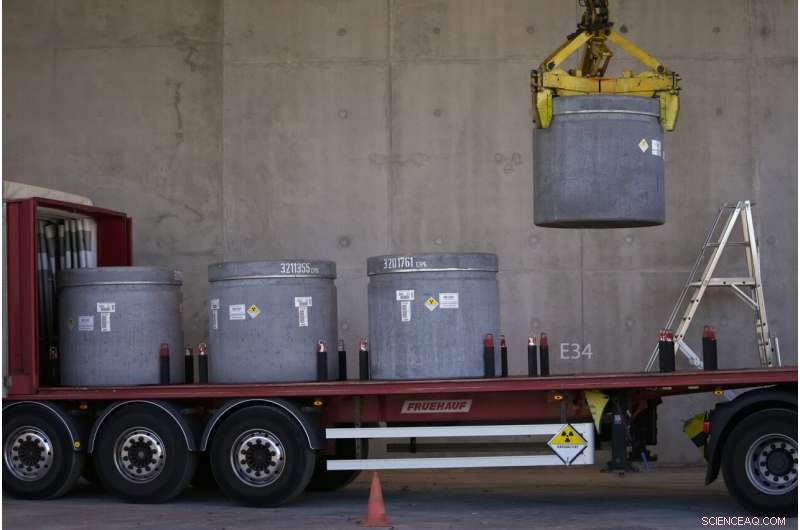
Radioactive waste storage is lifted from a truck in a concrete-sealed warehouse in the Aube region of eastern France managed by French radioactive waste management agency Andra, in Soulaines-Dhuys, Friday, Oct. 29, 2021. Deep in a French forest of oaks, birches and pines, a steady stream of trucks carries a silent reminder of nuclear energy's often invisible cost:canisters of radioactive waste, heading into storage for the next 300 years. Credit:AP Photo/Francois Mori
-
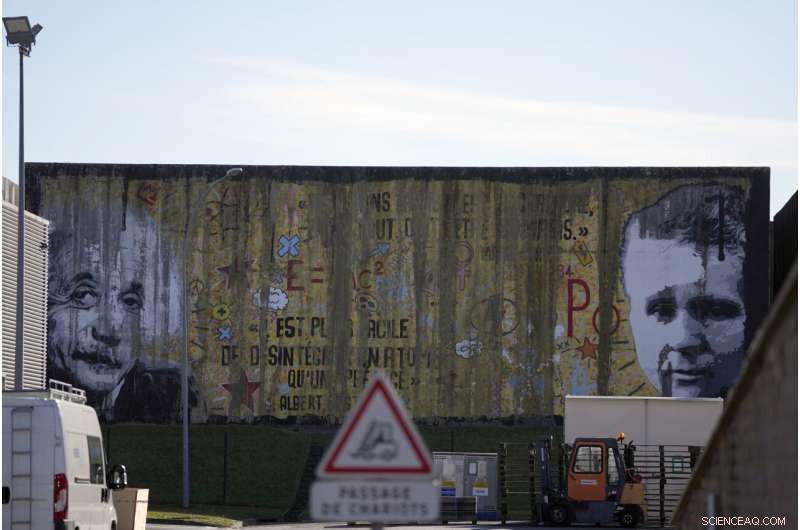
Portraits of scientists Albert Einstein and Marie Curie decorate a concrete-sealed warehouse for radioactive waste storage in Soulaines-Dhuys, eastern France, Friday, Oct. 29, 2021. The site holds low- to mid-level radioactive waste from French nuclear plants as well as research and medical facilities, and its concrete-sealed warehouses are designed to store the waste for at least 300 years. Credit:AP Photo/Francois Mori
-
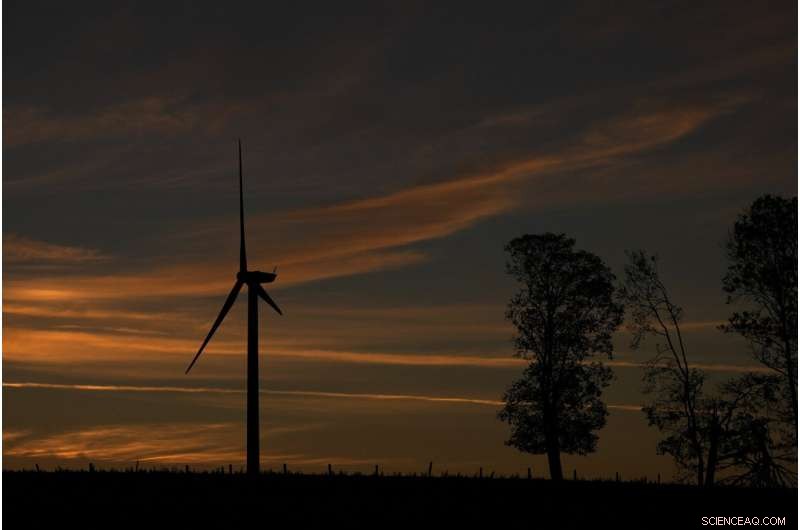
An electricity windmills stands next to an underground laboratory run by French radioactive waste management agency Andra, in Bure, eastern France, Thursday, Oct. 28, 2021. The laboratory, at around 500 meters below the surface, is designed to prepare for a proposed long-term deep-earth nuclear waste repository. Credit:AP Photo/Francois Mori
-
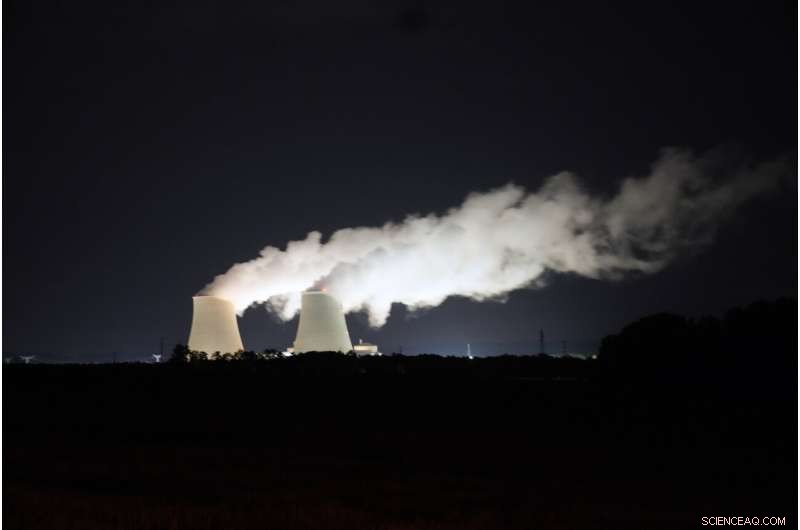
Steam escapes at night from the nuclear plant of Nogent-sur-Seine, 110 kms (63 miles) south east of Paris, Sunday, Aug. 8, 2021. Nuclear power is a central sticking point as negotiators plot out the world's future energy strategy at the Glasgow climate talks. Critics decry its mammoth price tag, the accident risk and deadly waste. But a growing pro-nuclear camp argues that it's safer on average than nearly any other energy source. Credit:AP Photo/Francois Mori, File
The waste, meanwhile, isn't going away.
To make radioactive garbage dumps less worrying to local residents, Andra organizes school visits; one site even hosts an escape game. Waste storage researchers are readying for all kinds of potential future threats—revolution, extreme weather, even the next Ice Age, Guillemenet said.
Whatever happens in Glasgow, "whether we decide to go on with the nuclear energy or not," she said, "we will need to find a solution for the management of that nuclear waste" that humankind has already produced.
 Nieuwe combinatie van materialen zorgt voor recordbrekende lithium-metaalcel
Nieuwe combinatie van materialen zorgt voor recordbrekende lithium-metaalcel Een methode bij lage temperaturen voor het maken van hoogwaardige thermo-elektrische materialen
Een methode bij lage temperaturen voor het maken van hoogwaardige thermo-elektrische materialen Klassieke wetenschap thuis: olifantentandpasta
Klassieke wetenschap thuis: olifantentandpasta Hoe warmteabsorptie te berekenen
Hoe warmteabsorptie te berekenen  Welke mineralen bevinden zich in een gloeilamp?
Welke mineralen bevinden zich in een gloeilamp?
 Geowetenschappers ontdekken dat Ancestral Puebloans overleefden van het smelten van ijs in lavabuizen in New Mexico
Geowetenschappers ontdekken dat Ancestral Puebloans overleefden van het smelten van ijs in lavabuizen in New Mexico Slimme tuinen helpen de aarde op aarde te redden
Slimme tuinen helpen de aarde op aarde te redden Hoe apparaten voor thuistanken werken
Hoe apparaten voor thuistanken werken  Studie geeft nieuw inzicht in herkomst Canadese Rockies
Studie geeft nieuw inzicht in herkomst Canadese Rockies Klimaatverandering kan leiden tot een algehele toename van de rivierafvoer, maar meer droogtes en overstromingen, studie toont
Klimaatverandering kan leiden tot een algehele toename van de rivierafvoer, maar meer droogtes en overstromingen, studie toont
Hoofdlijnen
- Een nieuwe rol voor insuline als vitale factor bij het in stand houden van stamcellen
- Is Migaloo dood? Terwijl klimaatverandering de oceaan verandert, wordt de iconische witte bultrug al twee jaar vermist
- Wat de neus niet weet, helpt dieren in het wild:olfactorische signalen gebruiken om kwetsbare soorten te beschermen
- Top tien feiten over de menselijke blaas
- Energiebesparende LED's stimuleren wereldwijd lichtvervuiling
- Nieuwe histonmodificaties koppelen metabolisme aan genactiviteit
- Chromosomale afwijkingen: wat is het?, Typen en oorzaken
- Wat is interfase, metafase en anafase?
- Zachte apparaten, aangedreven door gestresste algen, gloeien in het donker wanneer ze worden geplet of uitgerekt
- Een vakantiewonder? Winkels proberen lange rijen te verminderen

- Levering startup Instacart gewaardeerd op $ 7,6 miljard in financieringsronde

- Het andere nepvlees:Impossible Foods onthult varkensvlees, worst

- SoftBank Group boekt ergste kwartaalverlies Zoon geeft slechte beslissingen toe

- Houd niet van:Facebook gaat in beroep tegen Duitse uitspraak over datagebruik

 De Sint-Basiliuskathedraal van Moskou in 7 verschillende bouwstijlen
De Sint-Basiliuskathedraal van Moskou in 7 verschillende bouwstijlen  Wetenschappers beantwoorden langlopende vragen over relaxor-ferro-elektriciteit
Wetenschappers beantwoorden langlopende vragen over relaxor-ferro-elektriciteit RNA aanvallen met medicijnen met kleine moleculen
RNA aanvallen met medicijnen met kleine moleculen Video:Supersonische gasstralen schieten weg
Video:Supersonische gasstralen schieten weg Hoe cSt naar SUS te converteren
Hoe cSt naar SUS te converteren  Onderzoekers verkrijgen experimenteel supersoliditeitstoestand
Onderzoekers verkrijgen experimenteel supersoliditeitstoestand Transformatieve 3D-printbenadering vastgesteld op basis van inzicht in ontwikkelingsbiologie
Transformatieve 3D-printbenadering vastgesteld op basis van inzicht in ontwikkelingsbiologie Hoe snel de planeet opwarmt, is cruciaal voor de leefbaarheid
Hoe snel de planeet opwarmt, is cruciaal voor de leefbaarheid
- Elektronica
- Biologie
- Zonsverduistering
- Wiskunde
- French | Italian | Spanish | Portuguese | Swedish | German | Dutch | Danish | Norway |

-
Wetenschap © https://nl.scienceaq.com

